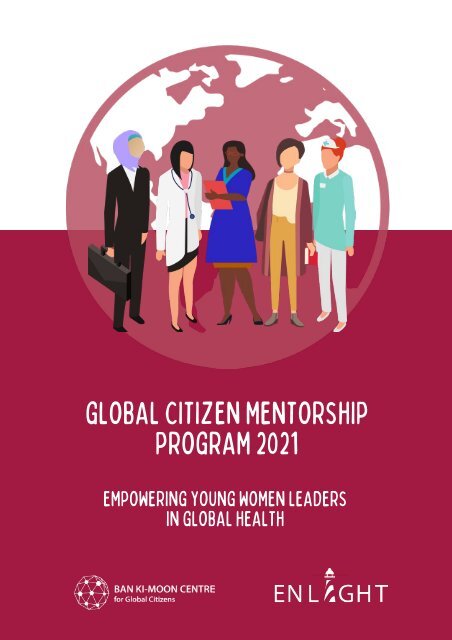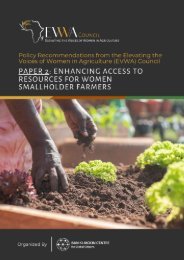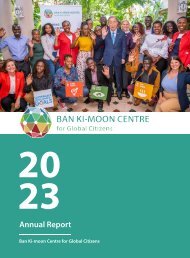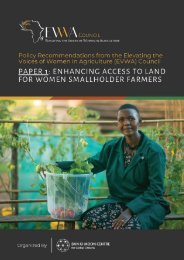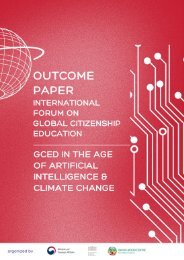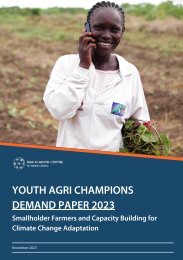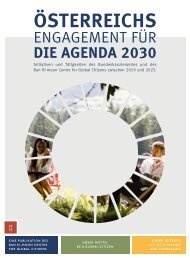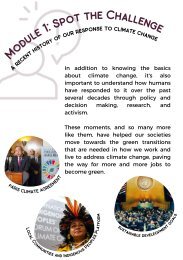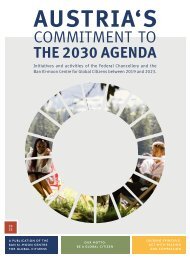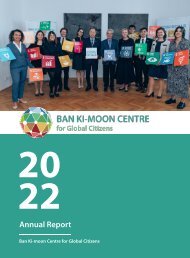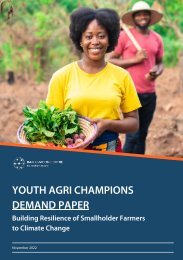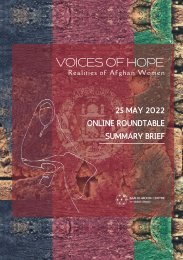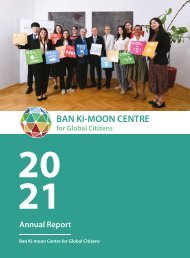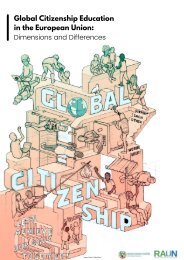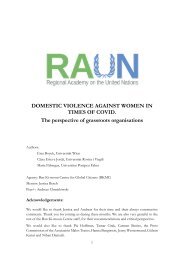Ban Ki-moon Global Citizen Mentorship Program - SDG Micro-Projects
This report spotlights the SDG Micro-Projects implemented, including the mentee's name and a short description of their project.
This report spotlights the SDG Micro-Projects implemented, including the mentee's name and a short description of their project.
You also want an ePaper? Increase the reach of your titles
YUMPU automatically turns print PDFs into web optimized ePapers that Google loves.
GLOBAL CITIZEN MENTORSHIP<br />
PROGRAM 2021<br />
<br />
EMPOWERING YOUNG WOMEN LEADERS<br />
IN GLOBAL HEALTH
BAN KI-MOON CENTRE<br />
GLOBAL CITIZEN<br />
MENTORSHIP PROGRAM<br />
2021<br />
The <strong>Ban</strong> <strong>Ki</strong>-<strong>moon</strong> Centre’s <strong>Mentorship</strong> <strong>Program</strong> 2021 empowered 15 emerging young<br />
women leaders in <strong>Global</strong> Health. <strong>Global</strong> Health is closely linked to <strong>SDG</strong> 3 ‘Good health and<br />
well-being’, a field where women are still underrepresented in decision-making and policysetting<br />
despite making up over 70% of the global healthcare workforce.<br />
The Centre collaborated closely with the ENLIGHT European University Network for this<br />
impactful program. Mentors and mentees from 4 ENLIGHT universities based in Europe<br />
(University of Bordeaux, Ghent University, University of Göttingen, and University of<br />
Groningen) and 5 global partners (University of Ibandan, University of Lomé, Universidad<br />
Autónoma Metropolitana, Universidad de Cuenca, and Mbarara University) participated in<br />
the program.<br />
The mentees implemented <strong>SDG</strong> <strong>Micro</strong>-<br />
<strong>Projects</strong> in their communities with the<br />
support of their mentors, focusing on<br />
spotting challenges related to <strong>Global</strong><br />
Health and finding meaningful solutions.<br />
Through one-on-one mentorship, peer-topeer<br />
exchange, capacity and skillsbuilding,<br />
support in the implementation of<br />
an <strong>SDG</strong> <strong>Micro</strong>-Project, and networking<br />
opportunities, the program empowered<br />
the mentees to become leaders in <strong>Global</strong><br />
Health, in turn supporting a more<br />
sustainable and equitable future in<br />
healthcare for us all.<br />
1
<strong>SDG</strong> MICRO-PROJECTS<br />
<strong>SDG</strong> <strong>Micro</strong>-<strong>Projects</strong> are initiatives that<br />
tackle one or more of the <strong>SDG</strong>s in a given<br />
community and context. The projects are<br />
designed and implemented by young<br />
changemakers who participate in the<br />
leadership and empowerment programs of<br />
the <strong>Ban</strong> <strong>Ki</strong>-<strong>moon</strong> Centre.<br />
As a part of the <strong>Mentorship</strong> <strong>Program</strong> 2021,<br />
15 <strong>SDG</strong> <strong>Micro</strong>-<strong>Projects</strong> were proposed and<br />
14 were finally implemented by the<br />
mentees with the support of their mentors<br />
reaching over 4,580 beneficiaries.<br />
The type of <strong>SDG</strong> <strong>Micro</strong>-Project per mentee<br />
varies from launching a campaign to<br />
hosting a workshop.<br />
8<br />
6<br />
4<br />
These projects addressed mental health,<br />
sexual health and reproductive rights,<br />
sexual violence, sustainable diets, stigmas<br />
around blood donation, and more.<br />
While all projects were related to <strong>SDG</strong> 3,<br />
they also addressed <strong>SDG</strong>s 4, 5, 8, 10, 11, 16,<br />
17.<br />
2<br />
0<br />
Podcast<br />
Consultation<br />
Campaign<br />
Lectures<br />
Academic Research<br />
Training/Workshop<br />
Online Platform<br />
2
The mentees had the opportunity to<br />
attend additional expert workshops to<br />
support their leadership development,<br />
including a workshop on <strong>SDG</strong> <strong>Micro</strong>-<br />
Project ideation and proposal writing, an<br />
expert talk with Austrian Doctor's without<br />
Borders CEO, a workshop on burnout<br />
prevention, and a final workshop on<br />
project pitching and public speaking.<br />
This report spotlights the <strong>SDG</strong> <strong>Micro</strong>-<br />
<strong>Projects</strong> implemented, including the<br />
mentee's name and a short description of<br />
their project.<br />
Danielle Fernandes<br />
"Development of a decolonization framework for<br />
global health at academic institutions" workshops<br />
carried out in Belgium<br />
BKMC Mentee Shireen Shehzad Bhamani’s <strong>SDG</strong><br />
<strong>Micro</strong> Project supports resilience building in elderly<br />
persons in convalescent homes in Pakistan.<br />
15<br />
MENTEES<br />
9<br />
COUNTRIES<br />
<br />
14 4.580<br />
IMPLEMENTED<br />
PROJECTS<br />
3<br />
PEOPLE REACHED
BAN KI-MOON CENTRE<br />
GLOBAL CITIZEN<br />
MENTORSHIP PROGRAM 2021<br />
<strong>SDG</strong> MICRO-PROJECTS
XIMENA ESTEFANÍA ÁLVAREZ<br />
UNIVERSIDAD DE CUENCA<br />
"Conferences about sexual and reproductive health in students of the<br />
University of cuenca"<br />
My project was a lecture series with the objective of contributing to<br />
the education of students on sexual and reproductive health at the<br />
University of Cuenca, Ecuador. The lectures targeted university<br />
students and emphasized contraceptive methods, care for our bodies,<br />
and exercising your rights. The aim was to raise awareness amongst<br />
the student body on the subject of sexual and reproductive health, in<br />
turn hopefully reducing the high incidence of unwanted pregnancies<br />
and the inappropriate use of contraceptive methods. To assess the<br />
knowledge gained during the lectures, a feedback questionnaire was<br />
distributed.<br />
DANIELLE FERNANDES<br />
GHENT UNIVERSITY<br />
"Development of a Decolonization framework for global health at<br />
academic institutions"<br />
My project aimed at developing guidelines for the the decolonization of<br />
the <strong>Global</strong> Health <strong>Program</strong> at Ghent University. The project utilized a<br />
participatory approach involving current students and faculty from the<br />
university. I set up a working group consisting of students and<br />
researchers within the department to provide oversight and guidance<br />
on the topic and to offer recommendations. Moving forward, I will<br />
conduct a sensitizing event and workshop for students and faculty of the<br />
medical department to promote awareness and co-develop a further set<br />
of recommendations. These recommendations will be delivered to<br />
program committee and the working group will provide further<br />
feedback on their implementation.<br />
ELIZABETH OKOYE<br />
UNIVERSITY OF IBADAN<br />
"Demystifying Blood Donation: What's True and What's not"<br />
My project identified and debunked common myths around blood<br />
donation amongst students and staff at the University of Ibadan, Nigeria.<br />
A survey was conducted to gather insights and to identify what was<br />
causing the reluctance to give blood. This information was then used to<br />
prepare a poster campaign aimed at raising awareness and reorienting<br />
the prospective of blood donors using science-based facts.<br />
4
HEBATALLAH ABDELRASOL<br />
UNIVERSITY OF GÖTTINGEN<br />
"Together for a better parkinson's care in Nigeria"<br />
My project aimed at helping to improve Parkinson's disease care in<br />
Nigeria, the most densely populated country in Africa and the 7th<br />
worldwide. There is an urgent need for immediate interventions and<br />
approaches in order to help relieve Parkinson's disease care in Nigeria.<br />
My project included two complementary approaches: first, an online<br />
patient survey to provide the first insights about patients' experiences<br />
with the limited access to care and affordable Parkinson's disease<br />
medicines. Second, the creation of a teleneurology platform to provide<br />
neurologists and non-neurologist health workers with training as well<br />
as knowledge and expertise regarding Parkinson's disease treatment<br />
and diagnosis.<br />
PAULINA KELLERSMANN<br />
UNIVERSITY OF GÖTTINGEN<br />
"Increasing awareness of a domestic violence hotline in georgia"<br />
My project was a campaign to raise awareness on domestic violence in<br />
Georgia. Domestic violence is a major public health issue in Georgia,<br />
but many people are not aware of the available support services. I<br />
implemented a sticker campaign to inform locals about a national<br />
hotline which provides free consultation on violence issues, and<br />
created an Instagram page to support and document it. The project<br />
enables survivors of domestic violence to receive important<br />
consultation and necessary support and contributes to gender<br />
equality in all of Georgia, but particularly in rural areas.<br />
ISABELLA VON POLENZ<br />
UNIVERSITY OF GÖTTINGEN<br />
"Healthbutcare"<br />
My project raises awareness for the mental health of healthcare<br />
workers all around the world and aims at de-stigmatizing the issue<br />
through an online exhibition on Instagram. I gathered stories from<br />
healthcare workers including quotes, photos, pieces of art, and more<br />
to share on my platform. Together with a graphic designer, I came up<br />
with the design and logo for the Instagram campaign. I hope to grow<br />
the campaign further moving forward.<br />
5
LUCIE VANHOUTTE<br />
UNIVERSITY OF BORDEAUX<br />
"Dietary Supplement - A food podcast"<br />
My project was a 5-episode podcast about food and how good<br />
nutrition lies in diversity and acknowledging the intrinsic beauty of<br />
family recipes. Each episode described a national dish with nutritional<br />
information. I conducted interviews for each podcast with restaurant<br />
owners or residents who could present a dish from their country.<br />
Contributors were living in various countries and places depending on<br />
the topic of the episode (France, Ethiopia, Togo, Indonesia, Belgium).<br />
My project contributed to raising awareness about healthy diets as<br />
well as cultural acceptance.<br />
LEA LEMKE<br />
UNIVERSITY OF GRONINGEN<br />
"Parkrun Leeuwarden"<br />
My project was aimed at encouraging inclusive physical and mental<br />
health through an organized run through the global Parkrun network.<br />
I planned to host parkruns in Leeuwarden, the Netherlands free of<br />
charge and also including a socializing element following the run.<br />
Further, the runs were envisioned to be barrier-free and inclusive for<br />
those less mobile or with special needs. However, given COVID and<br />
other considerations, the final runs could not take place. I learned a lot<br />
from my project and look forward to applying these lessons-learned to<br />
a new project in the future.<br />
MARIA BELEN TIRADO<br />
UNIVERSIDAD DE CUENCA<br />
"Adherence to the papanicolaou test in female patients of reproductive<br />
age attending the sinincay-san pedro del cebollar health center"<br />
My project sought to identify the key barriers to adherence to the Pap<br />
(Papanicolaou) smear screening tests in women at the San Pedro del<br />
Cebollar and Sinincay health centers in Ecuador. Barriers identified<br />
included fear about the test, shame, and concern that the personnel<br />
performing the test would be male. The project helped improve<br />
coverage of Pap tests and raised awareness amongst women in the<br />
community about the importance of performing the test regularly. The<br />
project helped improve access to this vital preventative healthcare<br />
measure for those who have difficulty approaching health clinics.<br />
6
CÉCILIA DUMAR<br />
UNIVERSITY OF BORDEAX<br />
"Mind, your business"<br />
My project was a portrait photography project highlighting mental<br />
health and how it impacts so many of our lives. The aim was to open a<br />
dialogue, normalize mental health struggles, and contribute to fighting<br />
the stigma surrounding it. 20+ portraits were taken for the project and 2<br />
exhibitions are planned to showcase the photos along with a<br />
establishment of a dedicated website gallery.<br />
AKIME YVONNE MURIEL NAPO-KOURA<br />
UNIVERSITY OF LOMÉ<br />
"violence among sex workers in Togo, 2021"<br />
My project enabled sex workers in Lomé, Togo, to better understand<br />
the concept of violence and to identify the different types of violence<br />
they experience. This empowered them to denounce the violence they<br />
may face in the future. I surveyed 447 sex workers in order to raise<br />
awareness about the violence they suffer as well as the prevention of<br />
sexually transmitted diseases. It is important to note that this is was<br />
the first time that data was obtained on sex workers in Lomé, Togo<br />
and the violence they are often subject to. The project supported the<br />
sex workers through sensitization and awareness raising regarding<br />
their rights as well as by providing information on sexually transmitted<br />
diseases. I look forward to taking this project forward and perhaps<br />
creating an NGO to support sex workers in Togo.<br />
SHIREEN BHAMANI<br />
GHENT UNIVERSITY<br />
"Reducing depression, increasing resilience and healthy coping among<br />
older adults living in elderly homes"<br />
My project aimed to decrease depression and increase resilience as<br />
well as healthy coping practices amongst elderly persons residing in<br />
care homes in Karachi, Pakistan. I did this by providing group<br />
workshops on different resilience building skills during a two day<br />
event. The theme of the first day was 'Expressing Humanity' and the<br />
second day's focus was 'Fostering Optimism.' This helped to minimize<br />
depression in the elderly community. I hope to scale this project up<br />
and to bring the tools developed to other settings.<br />
7
IDA ZIDA<br />
UNIVERSITY OF LOMÉ<br />
"Epidemiology of arboviruses in togo"<br />
My project sought to increase the number of healthcare workers with<br />
knowledge about arboviruses responsible for febrile syndromes in a<br />
country like Togo where malaria is endemic. I conducted a survey to<br />
assess the knowledge of healthcare workers on dengue in Togo, wrote<br />
an article analyzing the prevalence and immunization coverage for<br />
Yellow Fever, and equipped 11 labs with with rapid diagnostic tests<br />
(RDTs) for dengue. As a next step, I plan to equip all the labs in Togo's<br />
health structures with dengue RDTs and yellow fever ELISA kits and to<br />
train healthcare works in the use of these tests.<br />
Maria Belen Tirado<br />
"Adherence to the pap test in female patients"<br />
questionnaire & campaign carried out in Ecuador<br />
Cècilia Dumar<br />
"Mind, Your Business" photography project<br />
carried out in France & Germany<br />
Paulina Kellersmann<br />
"Increasing awareness of a domestic violence<br />
hotline" campaign carried out in Georgia<br />
8<br />
Elizabeth Okoye<br />
"Demystifying blood donation" campaign<br />
carried out in Nigeria
© 2021 by the <strong>Ban</strong> <strong>Ki</strong>-<strong>moon</strong> Centre for <strong>Global</strong> <strong>Citizen</strong>s<br />
P.O.B. 0018 1037 Vienna, Austria<br />
<br />
office@banki<strong>moon</strong>centre.org<br />
www.banki<strong>moon</strong>centre.org<br />
blog.naver.com/banki<strong>moon</strong>centre<br />
@banki<strong>moon</strong>centre


